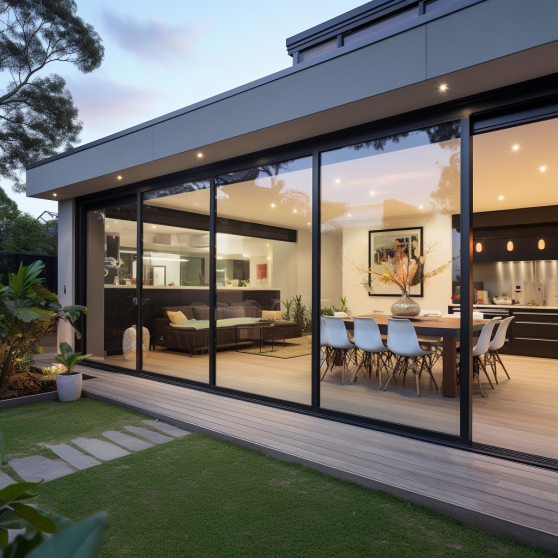Thermal windows and doors, characterised by their enhanced insulation properties, are becoming increasingly prevalent as key elements in modern architectural designs. They are recognised for their ability to maintain indoor temperature levels, thereby contributing significantly to the energy efficiency of buildings. At JL Windows and Doors, we specialise in the customisation, installation, and replacement of thermal windows, offering tailored solutions that align with this emerging trend towards enhanced energy efficiency and sustainability in building design.
What are thermal windows or thermally broken windows?
Thermally broken windows are an advanced type of window frame construction designed to significantly reduce heat transfer across the window frames, improving thermal insulation properties and energy efficiency in buildings. The “thermal break” refers to the inclusion of a non-conductive material between the inside and outside aluminium profiles of the window frame, effectively interrupting the thermal pathway.
How thermal windows work?

Contruction
Thermal windows are constructed with an aluminium frame that is divided into two separate interior and exterior pieces. Between these two aluminium components, a non-metallic insulator or thermal break is inserted. This material is typically made from polyamide or reinforced polyurethane, known for its low thermal conductivity.
Thermal Break
The thermal break acts as a barrier that prevents the transfer of thermal energy (heat or cold) through the aluminium frame. Aluminium, while strong and durable, is a highly conductive material that can easily transfer outdoor temperatures to the interior of a building. The thermal break stops this process, helping to maintain consistent indoor temperatures.


Energy Efficiency
By interrupting the heat transfer, thermal windows reduce the demand on heating and cooling systems within a building, leading to lower energy consumption and costs. They contribute to a building’s overall energy efficiency and comfort.
Our thermal windows and doors
Thermal Windows
Thermal Doors
Thermal Hardware
Benefits of Thermal Windows
Improved Insulation
Thermal windows offer better insulation against heat and cold, making them ideal for areas with extreme weather conditions.
Energy Savings
With improved thermal efficiency, they can significantly reduce energy bills by minimising the need for heating and cooling.
Condensation Reduction
They help to reduce the risk of condensation forming on the inside of the window frames, which can lead to mold and mildew problems.
Sound Insulation
The thermal break can also improve sound insulation, reducing the level of outside noise that enters the building.
Durability
Aluminium frames are known for their durability and resistance to corrosion, making them a long-lasting window option.
Thermally broken windows represent a blend of technology and design to improve living and working environments by offering superior thermal insulation without sacrificing the strength and durability that aluminium frames provide. They are particularly suited for modern constructions that require high energy efficiency standards and aesthetic flexibility.
For more types of windows, please click JL Windows Melbourne









